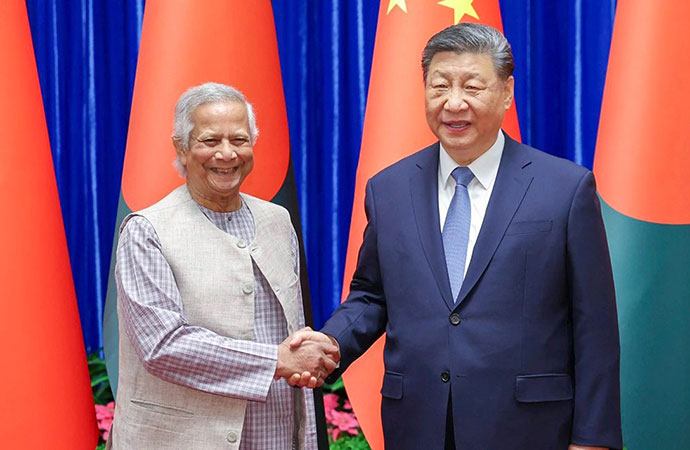Column

This March. Honourable Chief Adviser Professor Muhammad Yunus paid a historic visit to China. Bangladesh reiterated its firm commitment to the One-China Principle. Photo: Collected
Half a century after the UN General Assembly recognised the People’s Republic of China as the sole representative of China, debate over Taiwan’s status has resurfaced. China maintains its position under the One-China Principle, a policy long supported by Bangladesh in its bilateral relations
On 25 October 1971, the 26th session of the United Nations General Assembly adopted Resolution 2758 with an overwhelming majority. Once and for all. It resolved, politically, legally and procedurally, the issue of the representation of the whole of China, Including Taiwan, at the UN and its affiliated International organisations. It made it clear that there is but one China in the world. Taiwan is part of China and a non sovereign entity.
It also clearly affirmed that there is only one seat of China in the UN, and the Government of the People's Republic of China is the sole legal representative in the UN. There is no such thing as "two Chinas" or "one China, one Taiwan".
The authority of the resolution is based on International law and basic norms of international relations, and it receives widespread recognition and universal adherence from UN Member States.
However, individual forces, out of selfish geopolitical interests, deliberately distorted and challenged the UNGA Resolution 2758 recently. They trumpeted the false notion that the resolution "did not address Taiwan's legal status and did not specify sovereignty over Taiwan", and advocated support for Taiwan's participation In the UN multilateral forums.
Strongly challenging the One-China Principle and turning back the wheel of history, these moves are challenges to not only China's sovereignty and territorial integrity, but also international justice, conscience and the post-WWII international order. China strongly deplores and firmly opposes this.
From the aspect of historical facts, Taiwan has been an Inalienable part of China's territory since ancient times. This claim has a sound basis in history and Jurisprudence. In 1895, Japan forced the Qing government to cede Taiwan after Japan's war of aggression against China.
In 1945, the victory in the Chinese People's War of Resistance against Japanese aggression put Taiwan back under China's sovereign Jurisdiction. Both the Cairo Declaration and the Potsdam Proclamation, issued by major victorious nations of WWII, stated in explicit terms that Taiwan is a territory that Japan had stolen from the Chinese, and shall be restored to China.
Japan also signed the Instrument of surrender, in which it promised that it would faithfully fulfill the obligations laid down In the Potsdam Proclamation. China had recovered Taiwan de Jure and de facto through these documents with international legal effect.
From the aspect of the consultation process of Resolution 2758, the General Assembly had already reviewed the question of Taiwan's status under the UN Charter before the consideration and overwhelmingly vetoed two Taiwan-related proposals, which are the so-called "two Chinas representation" and "one China, One Taiwan and Taiwan self-determination".
This means that the UN, on the premise of recognising Taiwan as part of China, returned the representation and seat of the whole of China, including Taiwan, to the government of the People's Republic of China. The territorial scope of 'China' as a subject of International law has not been affected in any way and Taiwan's status as part of China has never changed.
In fact, even the so-called "representative" of Taiwan acknowledged that "Other countries have consistently emphasised the fact that Taiwan is part of Chinese territory, and I couldn't agree more on this point".
From the aspect of International practice, the UN and Its affiliated agencies have consistently upheld that Taiwan is a province of China and have handled Taiwan-related questions In accordance with the One-China Principle since the adoption of the resolution.
The UN Office of Legal Affairs has issued legal opinions stating very clearly that "the United Nations considers 'Taiwan' as a province of China with no separate status", "authorities In Taipei are not considered to enjoy any form of governmental status", use the term Taiwan Province of China when a reference to Taiwan is required in United Nations Secretariat documents".
The One-China Principle has always been the political foundation and fundamental premise for the establishment and development of diplomatic relations between China and other countries.
Over more than 50 years since the adoption of the resolution, 183 countries have established diplomatic relations with the People's Republic of China on the basis of the One-China Principle, fully showing that supporting the One-China Policy is where the public opinion trends and the arc of history bends.
China and Bangladesh are traditional friendly neighbours and comprehensive strategic cooperative partners. 50 years ago, China and Bangladesh established diplomatic relations on the basis of the One-China Principle. For the past 50 years, Bangladesh has steadfastly adhered to the One-China Policy.
This March, Honourable Chief Adviser Professor Muhammad Yunus paid a historic visit to China. Bangladesh reiterated its firm commitment to the One-China Principle and its position that the Government of the People's Republic of China is the sole legal government representing the whole of China, and Taiwan is an inalienable part of China's territory.
Bangladesh opposes "Taiwan independence". Bangladesh supports China on China's efforts to safeguard its national sovereignty and territorial integrity. The Chinese side highly appreciates the above-mentioned position.
Facts speak louder than words and justice will prevail. UNGA Resolution 2758 must not be challenged and Taiwan's sovereignty is unquestionable. We believe that the just cause of the Chinese government and people in safeguarding national sovereignty and territorial integrity, opposing 'Taiwan independence' separatism, and realising national reunification will surely continue to receive the understanding and support of the Bangladeshi people.
China also firmly supports Bangladesh in safeguarding its independence, sovereignty and territorial integrity, and supports Bangladesh in exploring a development path suited to its own national conditions.
China stands ready to work together with Bangladesh to continue supporting each other in safeguarding our respective core interests, firmly uphold international justice, and build the China-Bangladesh community with a shared future, so as to better benefit our two countries and peoples.
Yao Wen is the Ambassador of China to Bangladesh.

























Leave a Comment
Recent Posts
Religion and Politics: A Toxic ...
At Dhaka University, cafeteria workers have been told not to wear shor ...
Enayetullah Khan joins AsiaNet ...
AsiaNet’s annual board meeting and forum was held in Singapore, ...
In a New York minute
Many leaders back a UN call to address challenges to ..
Defaulted loans at Non-Bank Financial Institutions ( ..
How the late Zubeen Garg embodied cultural affinitie ..